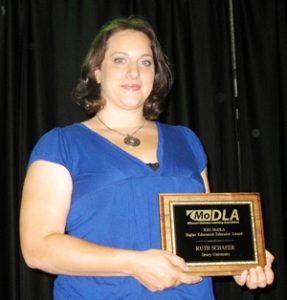
Ruth Schafer thought she would miss the look of understanding register on a student’s face during her move from the traditional to the online classroom. But after being recognized as Missouri’s top distance educator, Schafer said the virtual setting made her find new ways to explain lessons in unmistakable detail.
Schafer, an adjunct English instructor at Drury University in Springfield, Mo., was awarded the Missouri Distance Learning Association’s (MoDLA) Educator of the Year award July 27 after five years of teaching composition fundamentals, expository writing, and business communications at the 3,500-student school.
Web-based teaching wasn’t Schafer’s first choice, but Drury officials told her that online courses were the only available position when she applied to the university in 2005.
And with no experience in the online classroom, Schafer wasn’t exactly brimming with confidence.
“I was really reluctant to do it,” said Schafer, who taught English classes at Missouri’s Willard High School and Missouri State University before her time at Drury. “I didn’t see how I could be myself and communicate with my students the way I had always done in the traditional classroom. I just didn’t think I could do it.”
Spelling out every part of every lecture, Schafer said, wasn’t necessary during her days at Willard High and Missouri State – not because she lost focus on a topic, but because students’ reaction usually told Schafer if the lesson was understood or needed a touch of supplemental explanation.
“So many times [in a face-to-face class], you don’t have to finish your thought because you see kids nod their heads and you know they get it,” she said. “But online, every part of your thought has to be communicated so completely so there is no confusion. Clarity of message is very important.”
She added: “I became a quick convert to [online teaching].”
Effective teaching on the internet, she said, requires a little initiative from an educator trying to drive a point home in an online chat, for example.
Students in Schafer’s introductory English course “weren’t quite getting” a lecture on research citations, and unlike her days in the brick-and-mortar classroom, Schafer couldn’t show students the keys to a solid bibliography and works cited page in person.
So after online research between classes, Schafer used a video screen capture program from TechSmith’s Camtasia Studio program to show her steps in creating accurate citations.
“I knew if they could just see it in action how to do a work cited page, then they’d understand,” said Schafer, 35, a Missouri native. “As soon as I [posted the lecture capture video slides], I saw an immediate change in the quality of students’ source citations.”
Steve Hynds, the director of Online Education at Drury who called Schafer “gifted” and “innovative” when she won MoDLA’s annual award in July, said Schafer isn’t content with commonly-used online teaching techniques – a quality that rubs off on other Drury University instructors.
“Ruth’s passion for what she does inspires all who have the pleasure to work with her to do even more,” Hynds said.
From a novice in web-based education five years ago to an instructor who offers help and online resources to teachers new to distance education, Schafer said that a willingness to experiment with technologies is essential to improving communication with students on the other side of the computer screen.
“I’m someone who sees a problem, and if I want to communicate something and traditional means aren’t working, I will go looking for a technology that will help communicate that idea,” she said. “I try to self-educate myself as much as I can. … And that has led me to discover great resources … and allowed me to learn lots of little tricks.”
- Research: Social media has negative impact on academic performance - April 2, 2020
- Number 1: Social media has negative impact on academic performance - December 31, 2014
- 6 reasons campus networks must change - September 30, 2014
